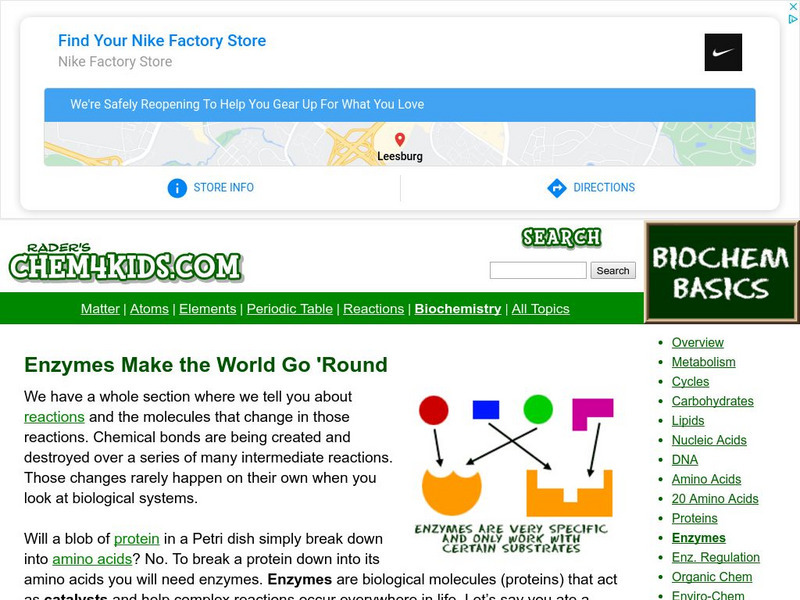Bio Topics
Bio Topics: How Enzymes Work
Understand how enzymes work with this page that includes animations and explanations. Learn that all enzymes are proteins and have specific catalytic actions.
Bio Topics
Bio Topics: The Action of Amylase on Starch
An experiment designed to show students how enzymes work. This experiment specifically investigates how amylase acts upon starch.
Sophia Learning
Sophia: Active Site: Lesson 3
This lesson shows that an active site is the space on an enzyme where a substrate would attach. It is 3 of 4 in the series titled "Active Site."
Sophia Learning
Sophia: Activation Energy: Lesson 2
This lesson will explain how activation energy is needed to start a chemical reaction. It is 2 of 5 in the series titled "Activation Energy."
Sophia Learning
Sophia: Activation Energy: Lesson 3
This lesson will explain how activation energy is needed to start a chemical reaction. It is 3 of 5 in the series titled "Activation Energy."
Sophia Learning
Sophia: Activation Energy: Lesson 4
This lesson will explain how activation energy is needed to start a chemical reaction. It is 4 of 5 in the series titled "Activation Energy."
Sophia Learning
Sophia: Activation Energy: Lesson 1
This lesson will explain how activation energy is needed to start a chemical reaction. It is 1 of 5 in the series titled "Activation Energy."
Sophia Learning
Sophia: Catalyst: Lesson 2
This lesson will describe that a catalyst is something which can speed up a reaction by lowering activation energy. It is 2 of 4 in the series titled "Catalyst."
Sophia Learning
Sophia: Catalyst: Lesson 4
This lesson will describe that a catalyst is something which can speed up a reaction by lowering activation energy. It is 4 of 4 in the series titled "Catalyst."
Sophia Learning
Sophia: Catalyst: Lesson 1
This lesson will describe that a catalyst is something which can speed up a reaction by lowering activation energy. It is 1 of 4 in the series titled "Catalyst."
Sophia Learning
Sophia: Competitive and Noncompetitive Inhibition: Lesson 2
This lesson will introduce the two types of inhibition found in enzyme interactions: Competitive Inhibition and Noncompetitive Inhibition. It is 2 of 4 in the series titled "Competitive and Noncompetitive Inhibition."
Sophia Learning
Sophia: Competitive and Noncompetitive Inhibition: Lesson 4
This lesson will introduce the two types of inhibition found in enzyme interactions: Competitive Inhibition and Noncompetitive Inhibition. It is 4 of 4 in the series titled "Competitive and Noncompetitive Inhibition."
Sophia Learning
Sophia: Competitive and Noncompetitive Inhibition: Lesson 1
This lesson will introduce the two types of inhibition found in enzyme interactions: Competitive Inhibition and Noncompetitive Inhibition. It is 1 of 4 in the series titled "Competitive and Noncompetitive Inhibition."
Sophia Learning
Sophia: Enzyme Structure: Lesson 2
This lesson will describe that enzymes are made of proteins, and can be found in nature or can be synthesized synthetically. It is 2 of 4 in the series titled "Enzyme Structure."
Other
Cytochemistry: Lysosomes and Peroxisomes
This site tells what lysosomes are and what their functions are. Also, the site discusses how the Golgi complex sorts lysosomal enzymes.
ClassFlow
Class Flow: Rates of Change
[Free Registration/Login Required] This is part 4 of a 4 part series to include the nature of chemical reactions, reaction types, and balancing chemical equations.
Chem4kids
Chem4 Kids: Biochemistry: Enzymes
This tutorial takes a brief look at enzyme activity and how enzymes work as catalysts.
Ducksters
Ducksters: Biology for Kids: Enzymes
Explore information about enzymes in the science of biology including what they do, how they work, and things that affect enzyme activity.
BiologyWise
Biology Wise: What Are Enzymes and How Do They Work?
Explains what enzymes are, the three broad categories, their working mechanism and two theories developed to explain this, and factors that impact enzyme activity.
BiologyWise
Biology Wise: Function of Rennin Enzyme
Explains sources of rennin and what its functions and uses are.
BiologyWise
Biology Wise: Rennin (Enzyme)
Explains how rennin is produced and why it is important in the human body. Describes some other uses of rennin and how it is sometimes confused with a different enzyme named renin.
BiologyWise
Biology Wise: Enzyme Substrate Complex
Discusses the properties of enzymes and the concept of enzyme-substrate specificity, and how a substrate molecule binds to an enzyme to form an enzyme-substrate complex. An overview of enzyme-substrate reactions is also presented.
BiologyWise
Biology Wise: Important Factors That Influence Enzyme Activity
Explains what is meant by enzyme activity and the factors that impact on their ability to function. Looks at temperature, pH value, substrate concentration, enzyme concentration, the presence of inhibitors, and allosteric factors that...
BiologyWise
Biology Wise: Effect of P H on Enzymes
Every enzyme has an optimal pH value at which it functions best. This article explains why pH has an effect on enzyme activity and how it affects them.




















